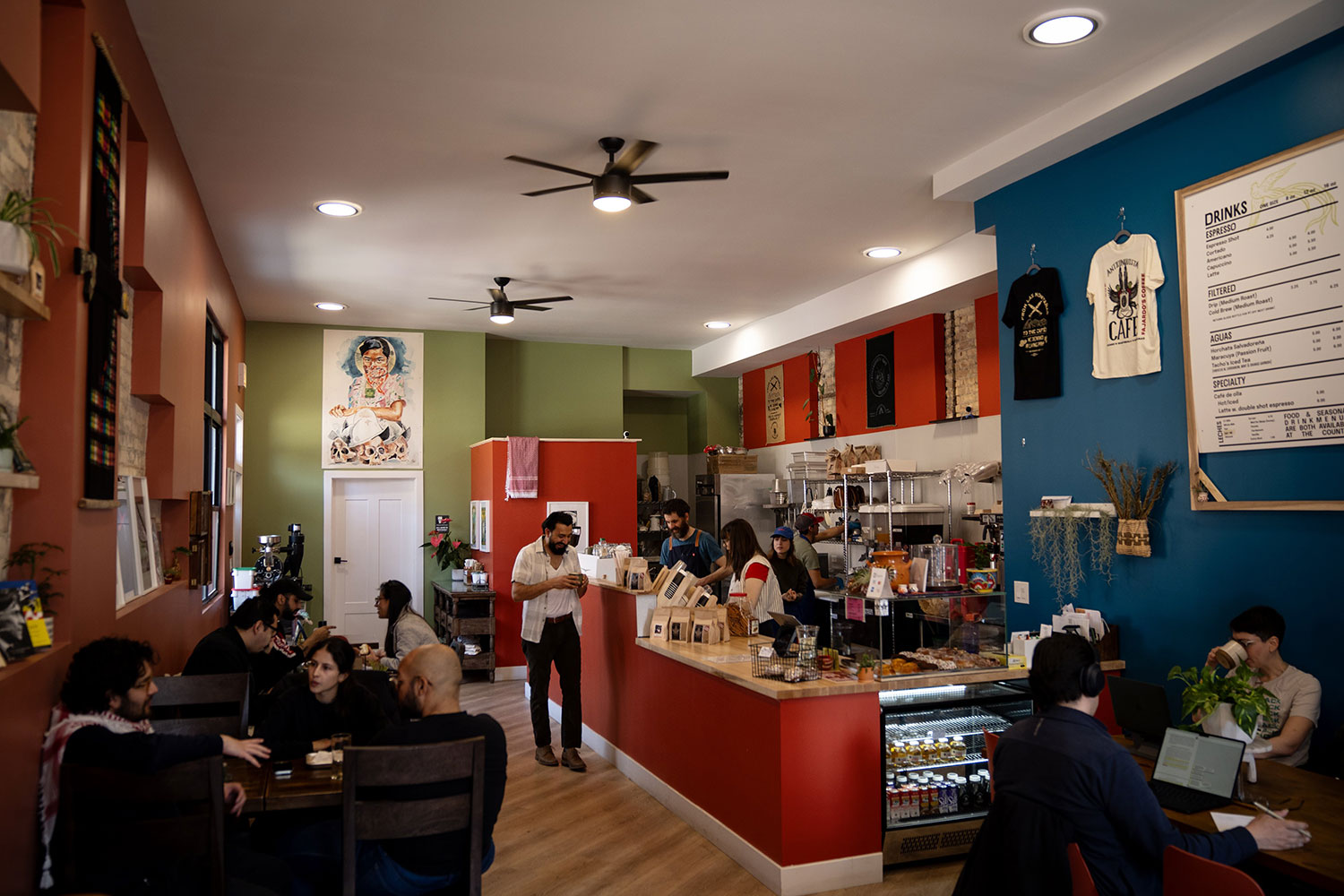Pilsen Community Books wears its politics in the front window. “Abolish ICE,” declares a flier taped to the glass. “From Palestine to Mexico All Walls Have Got to Go,” declares another. Inside the store, which is employee owned, the stacks are labeled with the headings like Marxism/Socialism, Anarchism, and Historical Materialism. Want to read American history? It’s under History of Turtle Island/so-called “United States.” If you’re looking for Mother Jones Speaks or The Autobiographies of the Haymarket Martyrs, Pilsen Community Books is the place to go.
A few blocks away, on 19th Street, is another bookstore that’s progressive in its own way. Open Books, a massive used bookstore, proudly declares itself “Profit Free Since 2006.” Open Books’ business model guarantees it won’t turn a profit. All the books are labeled with prices, but those are just suggestions, says executive director Jennifer Steele. Customers are free to pay as much or as little as they want. Open Books has four locations, but only Pilsen is pay what you wish, since it’s an underserved neighborhood. The children’s and young adult books? They’re all free.
Where else would you find the two most woke bookstores in Chicago but Pilsen, which is the city’s wokest, most progressive neighborhood. Pilsen is also home to the wokest coffee shop, Anticonquista Café, which was opened this year by Elmer Fajardo and his wife, Lauren Reese. Fajardo, who is from Guatemala, started working on his family’s coffee farm when he was 7 years old. He emigrated to Chicago when he was 17, “to help my family economically.” After years of working in restaurants, Fajardo began selling coffee from his family’s farm at farmers’ markets. Now, it’s the source of all the coffee at Anticonquista, whose name refers to the fact that “coffee is considered the second conquest of Latin America,” Fajardo says. “It’s just the massive amount of extraction of that resource. Ninety-nine percent of the coffee has to be imported into the United States. For us, we are working outside the traditional supply chain.”
As an immigrant operating in an immigrant community, Fajardo is sensitive about protecting his customers from ICE. A “Keep Our Community Safe” sign prohibits video calls and Zoom meetings “to maintain a safe space for our immigrant community.” Reese, a former bookseller, has also curated a small collection of “solidarity books” featuring authors from the Latino Boom.
“I definitely feel that people are happy we’re here and feel it’s a safe space,” Reese says.
The wokest neighborhood also has the wokest member of the City Council, Byron Sigcho-Lopez, an Ecuadorian immigrant who is consistently labeled a “firebrand” by the Tribune. During this month’s May Day march for workers’ rights, Sigcho-Lopez was the only alder to march and speak. Sigcho-Lopez is a member of the Democratic Socialist caucus, and a stalwart supporter of Mayor Brandon Johnson. Last year, he spoke at a City Hall rally against the war in Gaza where a former Marine burned an American flag. As a result, some of his conservative colleagues called for him to step down as chair of the Housing Committee, but the full council voted to keep him in his seat. As chair of that committee, he shepherded through Johnson’s Green Social Housing ordinance, to build more affordable housing.
Sigcho-Lopez, who often wears a Harold Washington button on his lapel, traces Pilsen’s progressive spirit back to Rudy Lozano, a community activist who helped sell the Latino community on Washington’s candidacy, creating the Black-Brown alliance that elected the mayor. Lozano ran for alderman, lost, and shortly thereafter was murdered by a gang member. Pilsen’s neighborhood library (currently closed for improvements, per its website) now bears his name.
As a historic port of entry for immigrants, dating all the way back to its origins as a Bohemian and Polish community, “we’re living on the dreams of our ancestors that look out for our neighbors,” Sigcho-Lopez says. Indeed, Pilsen was home to one of the city’s largest migrant shelters, which housed 2,300 immigrants who arrived in Chicago on buses until its closure in fall 2024.
Pilsen being Pilsen, though, Sigcho-Lopez isn’t progressive enough for some residents, who are pushing back against his plan to expand a Tax Increment Financing district from an industrial corridor to cover most of the neighborhood. A group calling itself Residents Against TIF Expansion has distributed a flyer calling TIFs “racist and exploitative” and claiming the TIF expansion “will fully gentrify our neighborhood and further displace residents.” Gentrification is a hot issue in Pilsen, which is close to downtown and has in recent years seen both a decline in its Latino population and an increase in its white population. Carnicerias and taquerias are interspersed with fashion boutiques, gourmet restaurants and, yes, bookstores and coffee shops.
“TIFs have been used to serve private interests and corporate interests rather than serve people from the neighborhood where the blight is,” says Leonardo Quintero, a neighborhood activist who sits on the 12th District Police Council and calls himself a TIF abolitionist.
By promoting an increase in property values, an expanded TIF will lead to higher taxes, which longtime residents can’t afford.
“It’s tough to keep up with raising taxes, especially in Pilsen,” Quintero says. “Pilsen has been gentrified, and with gentrification comes displacement.”
Sigcho-Lopez counters that he’s trying to rethink the traditional TIF, with plans to spend the tax money on schools, environmental remediation, and affordable housing, including 450 units at 18th and Peoria streets.
“Mayor Washington intended to use TIFs this way,” he says.
Still, he’s not surprised by the opposition to his plan. Pilsen is and always has been a politically active neighborhood.
“At community meetings, people show up and participate,” he says. “When ICE has come to our neighborhood, we protest. In Pilsen, we show up and we mobilize.”



